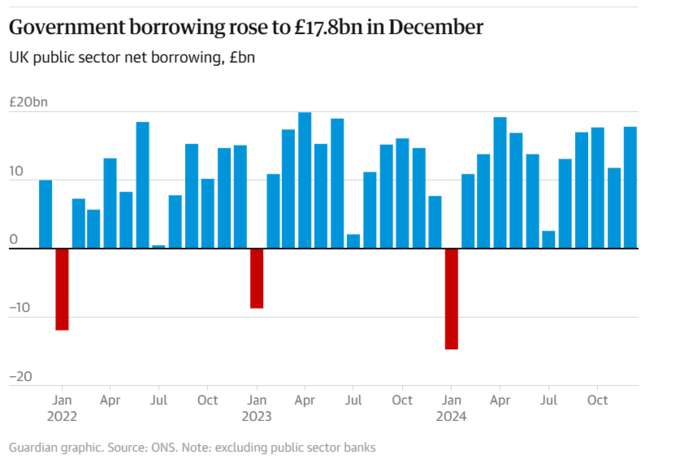UK government borrowing hits £17.8bn in December, well above forecasts

Increase to £17.8bn is well above City forecasts and is highest December figure for four years
UK government borrowing jumped unexpectedly to £17.8bn last month, piling pressure on Rachel Reeves to plan budget cuts before a spending review in the summer.
Local authorities were the cause of much of the rise after they borrowed an extra £4.1bn in contrast to central government departments that stuck to borrowing limits, according to the Treasury’s independent economic forecaster.
The monthly total was about a quarter higher than the City had forecast and was up by £10.1bn more than in the same month a year earlier, making it the highest December borrowing for four years.
Economists polled by Reuters had predicted that public sector net borrowing (excluding public sector banks) would be £14.1bn in December, up from £11.25bn in November.
The Office for National Statistics (ONS) said spending on central and local government services, benefits and debt interest payments was up.
Capital Economics said the latest figures showed Reeves’s financial leeway had been largely whittled away. The chancellor allowed in her autumn budget for a buffer of £9.9bn over the parliament, but the consultancy said the latest figures showed that could have fallen to about £2bn.
“That combined with a weakening economy suggest that, in order to meet her fiscal rules, the chancellor may need to raise taxes and/or cut spending in the next fiscal statement on 26 March,” it said.

In order not to break Reeves’s fiscal rule that day-to-day spending is matched by tax receipts, and having ruled out increases to either borrowing or taxes, the Treasury has indicated it is considering imposing spending cuts.
Whitehall department bosses are preparing to review their budgets and cut costs before a three-year spending review that the Treasury expects to be agreed in June.
Slower growth in the past six months than forecast in the budget, and higher debt financing costs because of climbing interest rates on government debt, are also expected to fuel a spending squeeze.
The Office for Budget Responsibility (OBR), the Treasury’s independent forecaster, singled out local authorities for pushing December’s borrowing figure above its own and City forecasts.
In addition to the extra £4.1bn borrowed in December, councils have added about £50bn to their debt pile over the last decade, some using the funds to purchase shopping centres and other investment assets while others have borrowed to stay afloat financially.
Analysts said the purchase of military homes from the private equity firm Terra Firma for almost £6bn was another reason for a rise in last month’s borrowing figures. An extra £1.7bn was needed to finance the deal for the Ministry of Defence.
The ONS data covers a period when the UK cost of borrowing had been climbing, but before the turmoil in global bond markets this month that sent the yield – effectively the interest rate – on government debt surging.
The yield on UK 30-year bonds rose last week to its highest level since 1998 before easing back after data showed the rate of inflation had fallen to a lower than expected 2.5% in December.
Reacting to the uncertainty, currency traders sent the pound tumbling to a 14-month low of $1.22 in early January before a modest rise of two cents in the last week. In September last year, the pound stood at $1.34.
Debt payments in December were £2bn lower than expected by the OBR between April and December. However, the jump in interest costs in January was likely to reverse this saving.
The chief secretary to the Treasury, Darren Jones, said: “Economic stability is vital for our number one mission of delivering growth; that’s why our fiscal rules are non-negotiable and why we will have an iron grip on the public finances.”
There will be a financial statement on 26 March and a budget in the autumn. The OBR will give a health check on the government’s budget targets at both events.
Jones said the government would “interrogate every line of government spending for the first time in 17 years” to “root out waste to ensure every penny of taxpayers’ money is spent productively and helps deliver our plan for change”.
Read more similar news:
Comments:
comments powered by Disqus

































